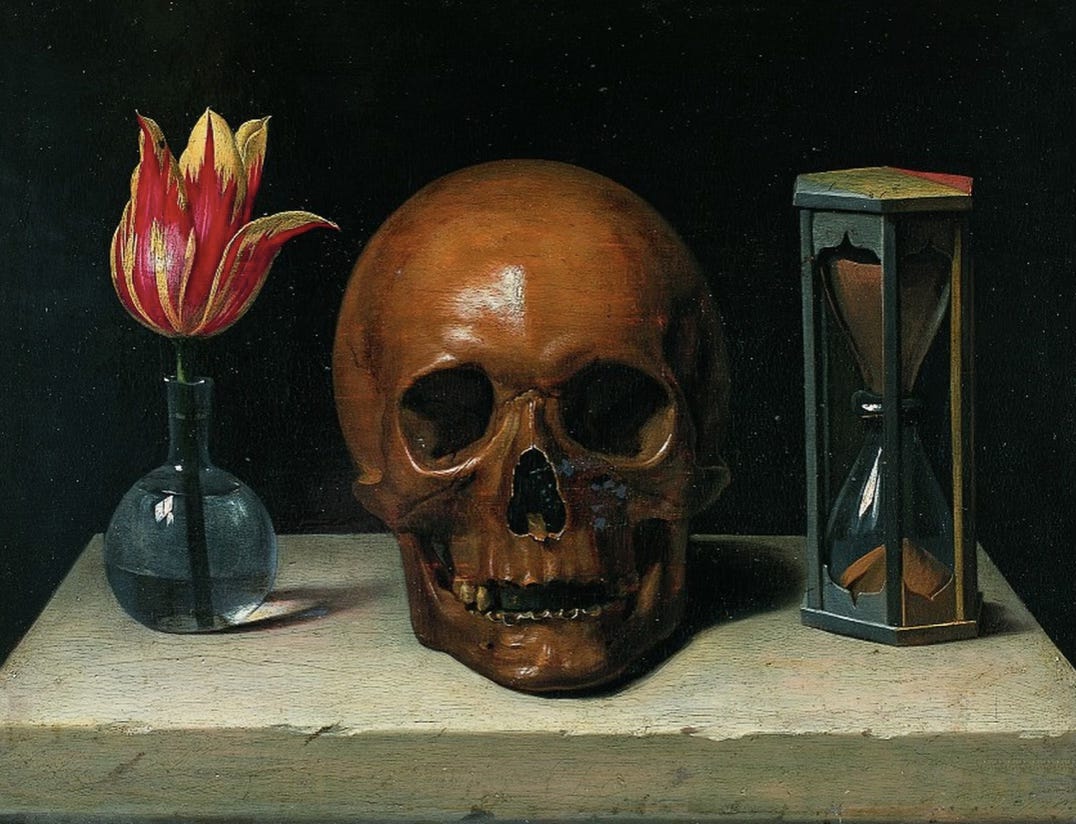Memento Mori
Learning To Live By Looking At Death
In case you might have forgotten recently, you are going to die.
I know… it would seem rather odd to forget something as inevitable and absolute as this, but you would be surprised to realize the depths to which we go to push something like this out of our present imagination. No one likes thinking about death, especially and specifically their own, and really, who are we to blame them. It is not something you normally find printed on your morning coffee cup.
But what if I were to tell you that the act of remembering your future death might actually be one of the very things that can change how you presently live?
This is not a new idea at all.
Look at what David says in Psalm 39:
“LORD, remind me how brief my time on earth will be. Remind me that my days are numbered— how fleeting my life is. You have made my life no longer than the width of my hand and my lifetime is as nothing before you. Surely all mankind stands as a mere breath!” (Psalm 39:4-5)
Remind me that my life here is short.
Remind me that I’m here for a limited number of days.
Whether you believe in God or not, you have to acknowledge that this is not only in the Christian Bible, but written as a prayer to God. Have you ever prayed this kind of prayer: “God, remind me that I am going to die” ?!
In other words: Memento Mori.
Memento mori is a latin phrase that is literally translated “remember death.” It is a peculiarly powerful meditative practice that finds its roots in ancient Greek and Roman philosophies as well as early Christianity. The object is simple: whether by art, architecture or festivals — place the reality of your inevitable death before you.
It wasn’t a complicated process. Some monks would simply place a real skull on their desk to remind themselves that one day they would end up just like that. Imagine saving a picture of a tombstone as your iPhone wallpaper.
A bit freaky, and yet undeniably sobering.
What was the goal of this odd practice?
Certainly it wasn’t to cast you downward into a darkening spiral of gloom. Life already has enough ways to do that (like taxes and traffic). The purpose was to place a level of sobriety upon your heart that takes the brevity of life seriously and fully. It was to snap you out of any lingering illusions that you could take your life for granted. In other words, like David wrote, “…how fleeting my life is!”
Knowing your life is short might seem like a common perception that everyone carries but the way we live speaks in contrasting terms. We freak out about things that bear no real consequence to our lives or futures, spend inordinate amounts of time and money on things that will literally fall apart — all the while overlooking the few things that deep down we know bear real weight, beauty and meaning.
Sure, I will concede that we as a society think about death. But not like we should.
We think about it just faintly enough to let it cause us fear but not fully enough to let it give us courage. In other words, death unsettles us enough that we spend time and money trying to avoid it and forget it at the expense of actually living out our short lives deeply now.
What comes to your mind and heart when you think about your own death? Does it unsettle you or does it put a steeled resolve in your soul to live differently now?
I’ll let all of that sink in... More thoughts to come in the next blog around death, Tolkien, hope and living life with a fresh zeal.
Engage In The Conversation
1. Engage by commenting below and share how practicing “memento mori” might help you live your day-to-day life differently.
2. Share this on social media or with someone else who might need to read this.




I'm part Mexican heritage, and our Día de los Muertos family tradition extends into the rest of the year. I keep our colorful, ceramic, painted skull in the bedroom to remember our life is precious and that death doesn't have the final say.